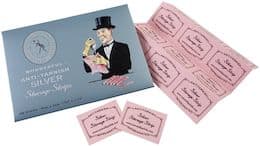
Curated with aloha by
Ted Mooney, P.E. RET

The authoritative public forum
for Metal Finishing 1989-2025

-----
How much does tarnish affect the conductivity of silver?
Q. Does SO2 tarnish on silver affect conductivity or produce intermittent electrical component? Is there a safe way to remove the SO2 tarnishing from the silver without damaging any of the plating process?
Jaime Enrique GarciaSwitch Manufacturing - El Paso, Texas
2004
|
A. Silver will tarnish in SO2, especially if it is moist. If the tarnish layer is thick enough, it will result in an electrically insulating layer that could result in an intermittent electrical fault. Removal can be achieved by polishing with a suitable silver polish, but it is all horses for courses.  Trevor Crichton R&D practical scientist Chesham, Bucks, UK 2004 A. Yes, the Silver tarnish does cause problems in switches when used for low voltages; that's why Gold is used in low voltage electronic switches. A higher voltage (24 to 50 Volts if I remember correctly) is able to 'punch through' the tarnish and the switch operates normally. And at higher currents, the small amount of arcing tends to clean a Silver contact but corrodes a Gold contact rather rapidly. Tom Gallant- Long Beach, California USA 2004 |
A. I've seen some telegraph key makers enclose acid free polishing paper strips to periodically pull through closed silver contacts. Most of the contacts I deal with are solid coin silver rather than plated and I just take my
Dremel
⇦ this on
eBay or
Amazon [affil links] cloth buffing wheel with a dab of polish paste on it and hit them a couple whacks. Usually, I only have to do that to a key I just got from someone that never ever cleaned the contacts on and I never have had to re-clean one I buffed to a mirror finish. Silver is a better conductor than gold by the way, but gold doesn't oxidize like silver does. Some makers of keys wised up and made what was described as a "wiping" contact that cleaned itself with each closure. I am more concerned about dust giving me intermittent contacts than oxidation on silver.
Now, carbon from arcing on contacts can really mess you up.
Dealing with high voltage and with RF goes a bit deeper than I am prepared to go with this response.
- Orlando, Florida, USA
2007
Multiple threads merged: please forgive chronology errors and repetition 🙂
Q. We manufacture an industrial product with silver plated contact pins. We have noticed many of the pins are tarnished. This does not seem to affect the operation. Would like to know for sure if tarnish affects the conductivity, and if so, how much?
Lowell BonnerManufacturing - Tulsa, Oklahoma
2005
A. Tarnish reduces conductivity since it is metal oxide not pure metal. Sometimes this is not enough to cause problems depending on electric factors (voltage, amperage) or mechanical (such as relative movement that sweeps tarnish away). When absolutely no tarnish is tolerated the plating normally is gold (palladium seems to be a good intermediate compromise between tarnish resistance and cost).
Guillermo MarrufoMonterrey, NL, Mexico
2005
A. Silver sulfide (tarnish) is conductive silver compound. Compared with pure silver conductivity is reduced.
Good luck!
Goran Budija- Cerovski vrh Croatia
2005
A. I believe silver sulfide is a semi conductor and will therefore conduct electricity, but nevertheless it will reduce the surface conductivity of the silver. To what extent will depend on the thickness of the tarnish. Surface tarnish will not affect the bulk conductivity unless the "bulk" thickness is very thin. When silver contacts are used, one of the factors that make them good is that the silver is soft and when rubbed against the other contact, it cleans itself and smears, so good metal-metal contact can be sustained. However, if the contacts are not designed to do this, there could be a longer term problem with an accumulation of low conductivity sulfides and oxides. Basically, any potential loss in conductivity depends on the design of the contact.

Trevor Crichton
R&D practical scientist
Chesham, Bucks, UK
2005
|
Monterrey, NL, Mexico 2005 A. All of the above is correct. It all boils down to voltage and contact pressure. If you do put gold over silver, be aware that the silver will walk right thru the gold in a few days; so use a barrier like nickel or palladium. If the silver is left on top, then dip it through one of the yellow colored slightly chrome bearing rinses in the shop and that will retard the tarnish.  Robert H Probert Robert H Probert Technical Services Garner, North Carolina  2005 |
Effect of silver brighteners on the electrical conductivity
Q. We are a Mexican company that makes copper electrical contacts for high voltage service. We apply silver plating on most of the parts, and as a rule a brightener is used for appearance, but, Does the commercial brighteners have any effect on the electrical conductivity of the pieces?
RICARDO DAVID LOPEZ- Mexico City, Mexico
2006
A. Dear Lopez,
There are bright silver organic brightener systems with the electrical conductivity of the deposit is similar to that of pure silver. I think the use of metallic brightener system can be avoided in your case.
Either way it is better to have a dialog with your brightener supplier to find out whether it is metallic or organic based.
Regards

T.K. Mohan
plating process supplier - Mumbai, India
2006
Q. I use AA silver impregnated fabric as an electroconducting surface as a switch; how can I prevent the silver oxidising and thus reducing conductivity?
Andy Houston- Minchinhampton, England
June 27, 2012
A. I've been in the electro power industry or 50+ years. For HV Switches in air, they had asbestos plates adjacent either side of each switch blade; this remarkably suppressed electrical sparks flash-overs but without deterioration of the asbestos -- i.e., a catalyst affect.
It's to be noted that side chemical reactions such as silver oxides or silver sulphides or similar may not be all bad as other spin offs can occur such as silver corrosion helping in mechanical contact lubrication that has been noted, and coating protecting further corrosion and or all other catalyst positives.
The real problem today is "Extinction Current" (ExC) -- i.e., current goes below certain level ... circuit goes off, i.e., open circuits of contacts, switches, plugs. etc. due to amalgam changes for cost sake whereas BILLIONS of dollars pa of equipment etc. is discarded as fault is not found due to subtle corrosion (i.e., shaking TV control to work).
Kevin Sayers- Werribee Werribee Australia
November 13, 2018
Q, A, or Comment on THIS thread -or- Start a NEW Thread
